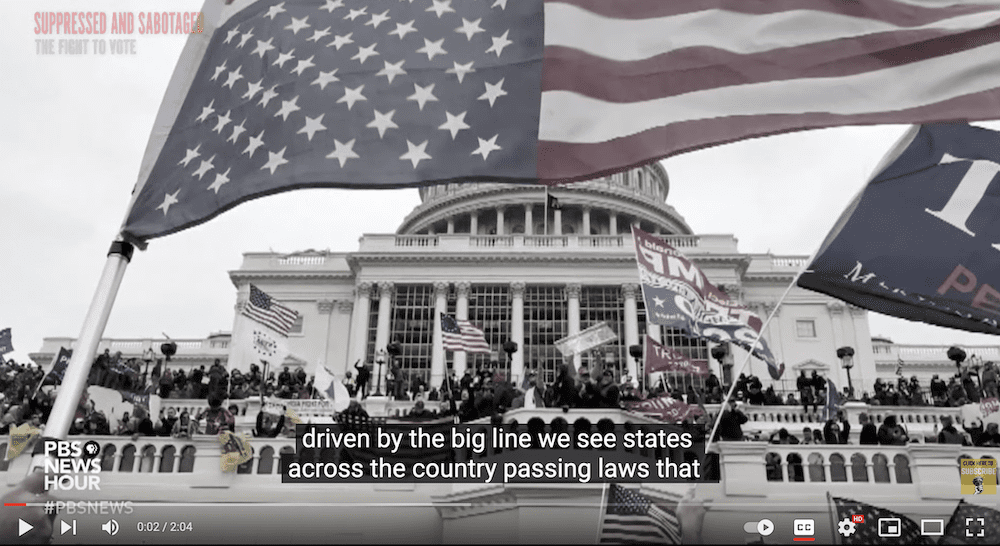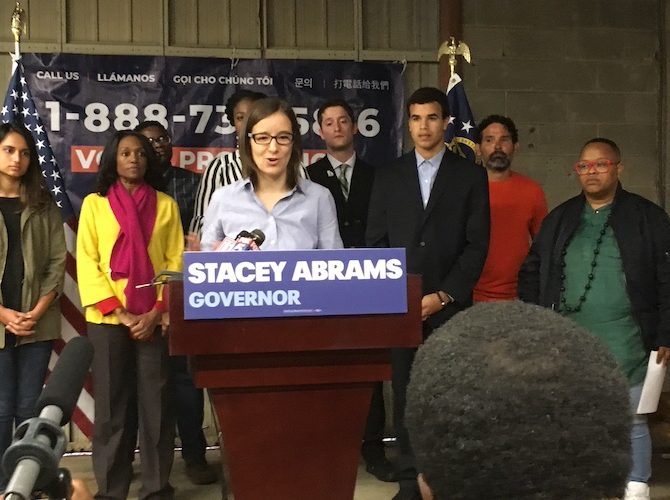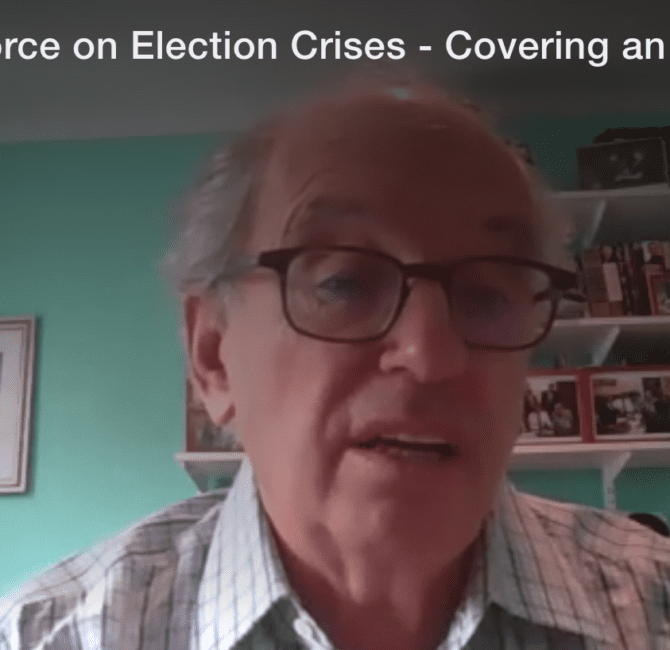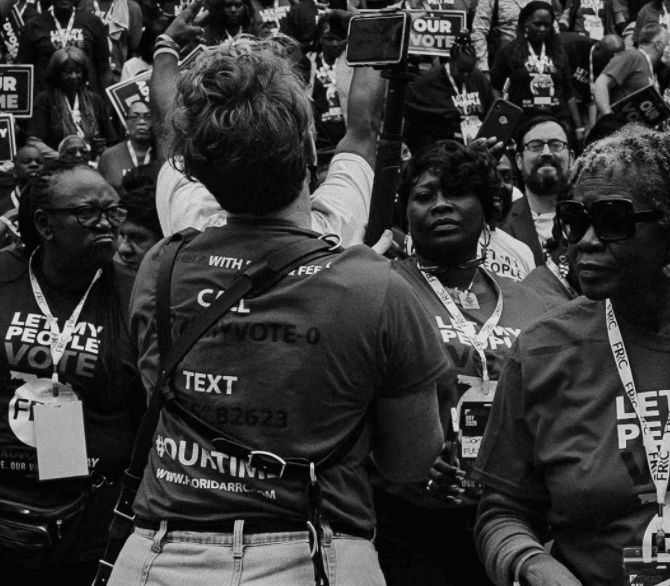Election Subversion is Replacing Voter Suppression as New GOP Threat

(Photo credit: screenshot from Brave New Films “Suppressed and Sabotaged”)
The language of the voting rights movement is changing. For decades, it had been centered around overcoming voter suppression and Jim Crow, which is shorthand for intentional barriers to stymie voters at the starting line—affecting their voter registration, their voting options, and whether or not their ballots are accepted. But today, thanks to Donald Trump’s 2020 election-denying loyalists, the focus is shifting to the finish line in elections, where counting votes is what matters. Election subversion is the new political buzz phrase.
One day after Georgia’s May 24 primary, where candidates who denied the 2020 presidential election’s results lost GOP nominations for governor and secretary of state, Marc Elias, the Democratic Party’s top election lawyer, wrote a post on his website Democracy Docket titled, “Election Subversion Is the New Voter Suppression.” A day before Georgia’s primary, Brave New Films, a nonprofit that produces progressive documentaries, held online screenings of an updated version of its film about voter suppression during Georgia’s 2018 governor’s race. Initially titled, “Suppressed: The Fight to Vote,” it now includes post-2020 subversion by Trump’s allies and is retitled, “Suppressed and Sabotaged.”
Just days before, a trio of pro-democracy groups—including the States United Democracy Center, whose advisers include Republicans who reject Trump’s 2020 claims, along with Protect Democracy and Law Forward—issued an astute report, “A Democracy Crisis in the Making: How State Legislatures Are Politicizing, Criminalizing, and Interfering with Election Administration,” which details how plans to overturn votes are becoming institutionalized. It traces how power grabs by GOP state legislators, via bills being introduced and passed since Trump’s defeat, are being woven into state law and vote-counting oversight to allow hyperpartisans to intervene and possibly tilt the results at key junctures.
The New York Times, in its Sunday, May 22, edition, cited the groups’ report amid a front-page analysis that affirmed that nearly half of Republican lawmakers in the top swing states have already acted to subvert results. It found that “44 percent of the Republican legislators in the nine states where the presidential race was most narrowly decided” used their office’s authority to “discredit or try to overturn” 2020’s presidential election results. States United’s report traces their follow-up steps, pushing and passing bills to let legislators and appointees intervene.
The terminology used to describe the threat of subverted or sabotaged election results is meant to be jarring. It is not merely a preview of early June’s House hearings about the January 6 insurrection, which are likely to show Americans that Trump allies in Washington and the states took part in a willful, political, and likely criminal, effort to overturn the 2020 presidential election. The emergence and naming of election subversion as a deepening threat is equally worrying, if not more so, about the future elections—in 2022 and 2024—compared to concerns about the last presidential election.
“We have a democracy crisis in the making,” States United concluded. “All of us who care about our democracy—regardless of political affiliation—must continue to use every tool we have to protect free and fair elections in this country, and to reject efforts to undermine them.”
Despite these examples, efforts to elevate public awareness of the prospects for election subversion in 2022 and 2024 are hampered by a problem common to many election issues: While warning signs abound, the threat has not yet materialized.
It is too early in 2022’s cycle to cite examples of Republicans subverting the popular vote at this stage in the process—in primaries. (The closest example is from Texas, where, under technicalities in a new state law, 12.4 percent of absentee ballots cast on March 1 were rejected. These voters attempted to vote by mail but did not satisfy the “new, stricter ID requirements enacted by the Republican-controlled Legislature last year that require voters to provide their driver’s license number or a partial Social Security number” when casting an absentee ballot, the Texas Tribune reported.)
The New York Times’ May 22 analysis also said the most aggressive power grabs have yet to bear fruit. It noted that many Republicans, already in statehouses, tried but failed to subvert the 2020 presidential results, which shows a power-grabbing mindset. But looking to 2022’s fall general election and beyond, the New York Times noted that would-be subverters have not yet reached critical mass as far as hijacking future results. “In most states, the lawmakers who challenged the 2020 results do not yet have the numbers, or the support of governors, secretaries of state or legislative leaders, to achieve their most audacious aims,” it said.
Mindsets and Actions
Still, it is undeniable that pro-Trump Republicans embrace power-grabbing tactics. The New York Times report focused on legislators who acted to overturn the will of the people in their state. Since then, in numerous 2022 primaries, Republican members of Congress who were elected on the same 2020 ballot where Joe Biden won—but who voted to reject their state’s Electoral College slate after the January 6, 2021, riot—have been rewarded by Trump supporters who helped them win their primaries.
And Trump has urged his handpicked candidates to prematurely declare victory. In May 17’s Pennsylvania primary, he told TV celebrity doctor Mehmet Oz, his pick for U.S. Senate, to declare victory and not wait for a recount. (Oz initially did not follow Trump’s script, but has since declared victory.) As the June hearings by the House’s January 6 committee approach, the panel is expected to show how scores of state and federal GOP legislators took part in a concerted but seat-of-the-pants effort to overturn the presidential election.
While the uprising may emerge as a criminal conspiracy—violating state and federal election laws in place at that time—what has unfolded in GOP-led swing states since January 2021 has been more deliberate tactics to achieve similar aims. The GOP’s strategy has centered on passing new laws empowering Republican legislators or their appointees to interfere at key junctures with counting votes.
“Contrary to what some argue, I don’t expect Republican election officials to blatantly ignore the election results and declare that the candidate who received fewer votes has won,” Elias wrote on May 25. “The Republican election subversion plan is more sophisticated than that. Instead, I expect Republicans to use false allegations of fraud as a pretext to remove ballots from the vote totals and then certify those incomplete results.”
“To accomplish this, Republicans—before an election takes place—will seek to sow doubt in the legitimacy or integrity of the ballots they aim to challenge,” he continued, alluding to the role that disinformation plays in fomenting electoral coups. “Maybe they’ll say that ballots cast in a certain kind of drop box are invalid, or that ballots collected by third-party organizations are illegal, or that voters who were given food and water while waiting in line should have their ballots discarded. The list of potential unsubstantiated claims of voter fraud is endless.”
The States United report further breaks down the building blocks of the subversion strategy that Republicans have been honing since the last presidential election. Unlike Trump’s sloppy post-election lawsuits, where conspiratorial claims and a lack of factual evidence led to 60-plus state and federal court rulings against him, pro-Trump legislators have been introducing bills, and in many cases passing them, to potentially usurp counting votes. This is a different strategy, and one that fits with their untested legal theory that the U.S. Constitution grants this authority.
The groups’ report delves into how Trump-aligned Republicans are meddling with the nuts and bolts of election administration. In contrast to hurling stolen election clichés in hastily drafted lawsuits, this detail-oriented strategy is what makes this development legally potent and increases the number of paths to subverting the popular vote. Under the modern version of Jim Crow, ruling-class politicians overpoliced many steps in the voting process, never knowing what would have the greatest impact in any year. This post-2020 subversion strategy takes that same scattershot approach to interfering in the ballot-verifying and vote-counting stages of elections.
“This year [2022] alone, lawmakers have introduced scores of new bills that increase the likelihood of election subversion, whether directly or indirectly,” the report’s summary said. “In some cases, the potential subversion is quite direct—for example, bills that give the legislature the power to choose a victor contrary to the voters’ will. In others, the impact is less direct but still dangerous. Some bills would introduce dysfunction and chaos into the election system and could lead to delay, uncertainty, and confusion, all of which could provide cover for subversion.”
The Blueprint
The report describes five categories of interrelated “legislative maneuvers” that build on each other and can cascade. The first is passing laws that “would give legislators direct or indirect control over election outcomes, allowing lawmakers to reject the choice of the voters.” While no such bills have become law in 2022, the report’s authors state that “the fact that they are even being introduced indicates that legislatures are considering the option.”
However, this category includes giving state legislators greater control over the operations and personnel at state and county election boards that certify winners. Such legislation has become law in Georgia, for example, and led to the firing of longtime election administrators and election board members in a handful of Democratic-leaning counties on the outskirts of Atlanta.
The second legislative maneuver is launching post-election “audits” or reviews by partisans with little or no experience in election administration and technologies. This is where undermining public trust in election administration and deliberately sowing chaos via made-for-right-wing-media spectacles is a pro-GOP tactic.
Seventeen states saw bills to allow these reviews, which “threaten to call election outcomes perpetually into doubt. They would tie up election administrators and likely would amount to state-sponsored vehicles for disinformation,” the report said, which is what happened in Arizona, Wisconsin, and Pennsylvania, all battleground states where Biden beat Trump by slim margins.
“The [post-election review] bills… lack standardized procedures, lack basic safeguards to protect the security of voting equipment and cast ballots, or fail to require that reviews be conducted by non-partisan election administration experts,” the report said. The post-2020 reviews did not alter any state’s presidential results, but, looking ahead, they “could be used to illegitimately delay certification of results, opening the door to conspiracy theories and subversion.”
The third maneuver is “shifting power from professional election administrators to partisan legislatures or legislatively appointed officials,” the report continued. This tactic would disrupt how the legislative and executive branches usually function.
“Among other benefits, this traditional allocation of power allows election administrators to respond to changing circumstances and exigencies,” the report said. This cooperation is what happened in 2020 when public health and election officials collaborated to make voting safer during the pandemic by encouraging voters to use mailed-out ballots—which Trump assailed.
Disrupting these roles, where legislators with little or no experience managing elections start imposing administrative decisions that run counter to the best practices of election professionals, leads to the fourth category of overreach, “creating unworkable burdens in election administration.”
“We are seeing a wave of legislation that interferes with the most basic routines and procedures of local election administrators—such as voter roll maintenance, testing election equipment, and tabulating ballots—in ways that impose new, unworkable burdens on them,” the report said. “One particularly dangerous flavor of these bills, under consideration in six states, would require all ballots to be counted by hand, practically guaranteeing delays, higher rates of counting error, and increased risk of tampering by bad actors.”
The final maneuver is “imposing disproportionate criminal or other penalties” on local election officials for doing their job, which includes maintaining order as ballots are processed, while empowering GOP observers at these stages.
The GOP’s publicized premise for these interventions is the claim that elections must be better protected from illegal meddling, although there is no evidence that such fraud or illegality occurred on any scale in 2020. What’s not said is the party’s pro-Trump wing is seeking to put its thumb on the scale at the finish line.
“True interference with voting and elections is already illegal, and rightfully so: Nobody is allowed to commit voter fraud, threaten or bribe voters, undermine the security of voting machines, or destroy ballots, for example,” the report continued. “But these new bills create vague, subjective categories of misconduct that would leave election officials vulnerable to litigation and prosecution by partisan actors.”
The report is sobering. It shows that many Republican state lawmakers have been radicalized, not chastened, by the January 6 insurrection, as they look at 2022 and 2024 elections. (Some GOP operatives have been working to train poll workers to infiltrate election offices in swing counties in swing states, Politico reported, yet another strategy to insert partisans into traditionally politically neutral roles.)
“It is no longer about the will of voters in some of our counties right now. It is a very scary time for us in Georgia,” said Wanda Mosley, Black Voters Matter national field director, speaking at the May 23 showing of Brave New Films’ documentary “Suppressed and Sabotaged.” “Because what is guaranteed to us, the right to vote as citizens of this country, is under grave attack.”“If you think that this [subversion scenario] is fanciful, then you were not paying attention to what happened after the 2020 presidential election and to what Republican state legislatures have done in the meantime,” wrote Elias.






